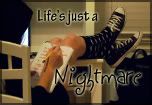 Title: Zoo
Title: Zoo
Author: Ostu-ichi
Pages: 257
Recieved from: Amazon
Summary:
Ten stories of horror and science fiction from Japan’s hottest young author. In one story, the last man on Earth turns out to be a robot. In another story, a man builds a house from the bodies of his murder victims. And in the book’s eponymous story, a man sees his girlfriend’s corpse decompose… one Polaroid snapshot at a time!
After reading the beautifully horrific Goth sometime last year, I immediatly began trolling the interwebs for more by the author, Ostu-ichi (apparently Hot Shit in his native Japan). I was thrilled to find Zoo for a cheap enough price, and eagerly opted to shell out my giftcard for Amazon.com to buy it. Needless to say, I had high expectations. And the only word of advice I have for my 200-something followers? Don't have high expecations.
Again, perhaps this is because my hopes for it was in the range of one of Jupiter's moons, but I finished Zoo with the feeling that I had been cheated, the maybe something was lost in translation or my mind couldn't process what I was reading, or maybe I was just stupid, but there it is. It sparked and sizzled but ultimatly never burst to life. While the stories themselves ranged from meh to faintly chilling, the execution and prose left me feeling like I had just read ten stories on the same person at different stages in their life. In fact, I would go as far to say the author was just paying a half-assed homage to Haruku Maruki, messing around with overdone horror tropes and never really putting his own spin on them.
Not to say the collection was a complete failure. Again, the stories were all entertaining for what they were worth, with a few exceptions ("Find the Blood!" and "Wardrobe" come to mind) and its obvious Ostuichi has a very creative head on his shoulders. Too many of the stories start off slow and bland, but if you can bring yourself to the end bits you'll be rewarded for your efforts (though you, as a reader, shouldn't have to be making any efforts at all...*grumble*). There are some O.Henry throwbacks, with some genrebending endings, even though the genres were ambiguious to begin with. And, I'll say again, two thirds of the stories were unmemorable duds, but the ones that stand out...well, lets say they really stand out. "Song of the Sunny Spot", for example. About a robot who is created by the seemingly last man on the planet whom, after an apocolyptic virus kills the population, needs someone to bury him. Hauntingly surreal, with a naivety only available for a newborn robot just discovering the beauty of the world, "Sunny Spot" explores the boundries of lonliness and what it takes to really appreciate your surroundings. While its definetly not horror, sci-fi fans would no doubt squeal with delight.
Another lovely addition is "SO-far". A child finds one day that his parents can't seem to see or hear each other, both explaining to him that the other is dead. At first reading like a fantasy or sci-fi, "SO-far" ends up being a rather obvious message about the effects of divorce on a child. I'll admit, though--it was cleverly written, with that same naivety Ostuichi injected into "Sunny Spot" that just worked (but, now that I think about, he uses in most of the stories...)
My main issues are as followed, in order of irriation: translation. Translation, translation, translation. We've all been there. When picking up a translated work, be it dubbed cartoons or foreign novels, there is always the chance that everything will read like Julia-Child-marbles-in-throat-gibberish. Not that Zoo was unreadable. I just found it to be so fake and formal and disconnected, which when reading Goth would make sense, but with Zoo it just comes off as flat.
My other issue is "Kazari and Yoko"...jeezus. Pure exploitation, no discernable plot, tired Cinderella tropes without the fairytale fuzziness and likeable heroines...dear God, I was cringing the entire time. About a girl, Yoko, who suffers from horrible abuse by her mother while her twin sister Kazari is treated like an angel, she finds her only escape is to trick Kazari into switching places with herself and ultimatly being thrown off a fucking building.
Not that I'm opposed to fiction about domestic violence, but there was absolutly nothing about this story that gave you the idea that it led anywhere. It just reads like senseless misery.
The entire abuse angle apparently agress with the author, as the theme pops up in nearly all of his stories at some point. But the thing is; when mentioned in his other stories, it makes sense. It leads the reader somewhere, it adds to the plot. But "Kazari and Yoko" was just this. This is Yoko, she's treated like shit, she eats only when her sister doesn't want to finish her meals. She's miserable. Blah.
I'm not going to go into it, but perhaps it would provide some nosh for an overactive brain--where is the line between abuse for fiction and abuse for abuse? Is there any way to write tasteful violence? Does a story about abuse need an actual plot?
Overall, Zoo had its ups and downs (with an uncomfortable amount of downs), but never fails to entertain. Reccomended with reservations.
Rating: 5-6 out of 10
Also: made into an anthology film which looks quite good, if I can find some kind of subtitle'd copy-
check out the far superior Goth by the same author and his other collection, Calling You.

















0 comments:
Post a Comment